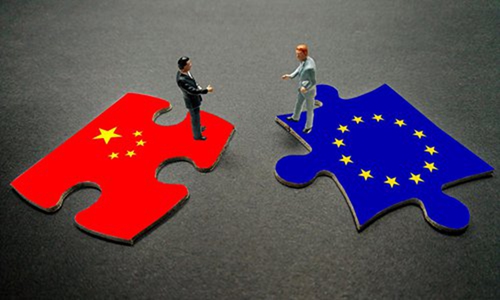Ball is in EU's court for reaching BIT with China: expert
By Wang Cong and Yin Yeping Source: Global Times Published: 2020/11/19 19:01:46

Photo: IC
The EU should make a firm decision and not wait for new policy direction from the US government to push forward the completion of the China-EU bilateral investment treaty (BIT) talks at the year-end, a Chinese expert said.While both China and EU have vowed and appeared to be committed to completing the sweeping investment deal by the end of this year -- substantially open up each other's investment markets, there remain some sticking points over market access and other issues, according to trade officials, business leaders and experts.
"We remain committed as agreed by our leaders to closing the remaining gaps before the end of the year. As the leaders noted, high-level political engagement would be required within the Chinese system to achieve a meaningful agreement," EU Ambassador to China Nicolas Chapuis told the Global Times on Thursday, while adding that the negotiations are now at an "advanced stage."
During the China-EU summit in September, leaders from both sides said that the two sides would accelerate negotiations and wrap up the talks before the end of the year. Chapuis did not elaborate what "high-level political engagement" within the Chinese system entails.
But in a statement sent to the Global Times on Wednesday, the European Chamber of Commerce in China said that successful conclusion of the BIT deal "hinges upon China making stronger offers on market access and sustainable development that can be accepted by the EU."
However, Cui Hongjian, director of the Department of European Studies of the China Institute of International Studies, said that the ball is actually in the EU's court to complete the deal, as Brussels appears to be demanding that the negotiations "completely follow its standards and paths," while China is pushing for mutual compromises to be made and clinch a deal at the earliest.
"Negotiations cannot be based on entirely one party's demands," Cui told the Global Times. "The main problem is not with the Chinese side; rather it is about how decisive the EU needs to be to make that happen."
Specifically, EU thinks that China's offers in market access, labor protection and environmental issues are not sufficient, while the Chinese side thinks that the EU should also make some compromises, not just China, according to Cui.
Geopolitics may have also had a role in the EU's reluctance to compromise, as EU officials appear to be looking at the incoming new US administration in January, which might rebuild relationships with allies in dealing with China-related issues, to gain some leverage in the BIT negotiations, Chinese experts suggest.
"If the EU wants to reach BIT deal, such a mentality is not helpful," Cui said.
RELATED ARTICLES:
Posted in: ECONOMY